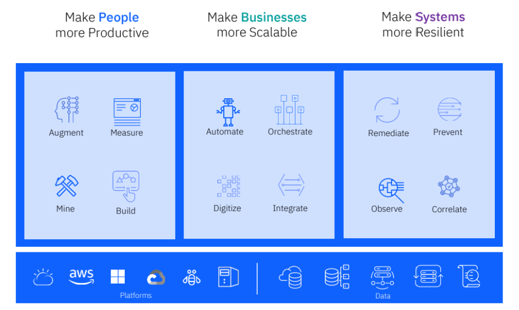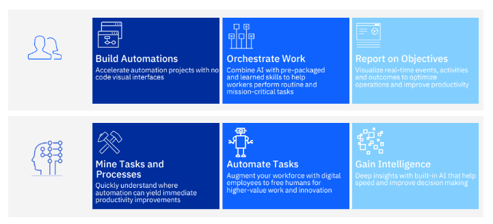In an era defined by digital transformation and efficiency, businesses are increasingly turning to automation to streamline their operations. One such powerful tool in the realm of automation is IBM Robotic Process Automation (RPA). In this blog post, we'll delve into the world of IBM RPA, exploring its key features, benefits, and how it is shaping the future of business processes. Understanding ...
In an era defined by digital transformation and efficiency, businesses are increasingly turning to automation to streamline their operations. One such powerful tool in the realm of automation is IBM Robotic Process Automation (RPA). In this blog post, we'll delve into the world of IBM RPA, exploring its key features, benefits, and how it is shaping the future of business processes.
.png?width=536&height=287&name=fiji%20blog%20(2).png)
Understanding IBM RPA:
Robotic Process Automation, or RPA, refers to the use of software robots or "bots" to automate repetitive, rule-based tasks within business processes. IBM RPA is a comprehensive solution designed to enhance operational efficiency by automating mundane and time-consuming tasks, freeing up human resources for more strategic and creative endeavors.

Key Features of IBM RPA:

-
User-Friendly Design: IBM RPA comes with an intuitive and user-friendly design that enables users to create automation workflows with ease. Its drag-and-drop functionality allows even those without extensive programming knowledge to design and implement automation processes.
-
Cognitive Capabilities: Leveraging advanced technologies like artificial intelligence (AI) and machine learning (ML), IBM RPA goes beyond basic rule-based automation. The solution can adapt to changing scenarios, learn from patterns, and make decisions based on real-time data.
-
Integration with Existing Systems: IBM RPA is designed to seamlessly integrate with a variety of existing systems and applications. This ensures a smooth transition to automation without the need for a complete overhaul of existing infrastructure.
-
Scalability: Whether you are a small business or a large enterprise, IBM RPA is scalable to meet your automation needs. It can grow with your organization, adapting to increasing workloads and expanding automation requirements.
Benefits of IBM RPA:

-
Increased Efficiency: By automating repetitive tasks, IBM RPA allows organizations to complete processes faster and with fewer errors. This not only increases efficiency but also enhances the overall quality of work.
-
Cost Savings: Automation reduces the need for manual intervention in routine tasks, leading to significant cost savings in terms of time and resources. IBM RPA allows organizations to allocate human resources to more value-added activities.
-
Improved Accuracy: Bots deployed through IBM RPA are programmed to follow predefined rules with precision. This reduces the likelihood of errors that can result from manual data entry or repetitive tasks.
-
Enhanced Compliance: In industries with strict regulatory requirements, IBM RPA ensures that processes are executed consistently and in compliance with regulations. This reduces the risk of human error and associated compliance issues.
-
Quick ROI: Organizations adopting IBM RPA often experience a rapid return on investment (ROI) due to increased productivity and cost savings. The time saved by automating repetitive tasks allows teams to focus on strategic initiatives that drive business growth.
IBM Robotic Process Automation is a game-changer in the automation landscape, providing organizations with the tools they need to enhance efficiency, reduce costs, and stay competitive in an ever-evolving business environment. As businesses continue to embrace digital transformation, IBM RPA stands out as a powerful solution that empowers organizations to automate intelligently, driving innovation and growth.
Want to learn more about RPA? Book us!
Book me an RPA discovery call
we go the extra mile so you can go the distance|
Got a question? Shoot!
Lorem ipsum dolor sit amet, consectetur adipiscing elit, sed do eiusmod tempor incididunt ut labore et dolore magna aliqua.


.png?width=673&height=371&name=IBM_Gold-removebg-preview%20(1).png)
Leave a comment